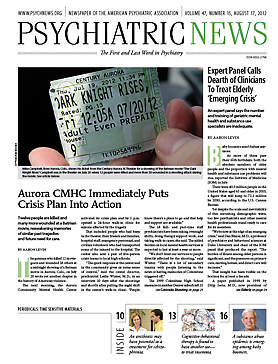Current literature is adequate for APA to develop consensus-based treatment recommendations for patients—including children and adolescents—with gender identity disorder (GID) and associated disorders, including disorders of sexual development.
And for adults, the research base is sufficient for the development of a formal APA practice guideline, with gaps in the research database filled in by clinical consensus.
Those are the principal findings of the Task Force on Treatment of Gender Identity Disorder, which was appointed by the APA Board of Trustees in 2008. A report from the task force appears as a data supplement to the August American Journal of Psychiatry.
Task Force Chair William Byne, M.D., noted that treatment recommendations focusing on a process of stepwise transitioning for individuals wishing to change their gender were originally published in 1979 by the Harry Benjamin International Gender Dysphoria Association (now the World Professional Association for Transgender Health—WPATH). More recently the Endocrine Society has developed an evidence-based guideline for cross-sex hormone administration and also for pubertal suspension in adolescents.
But Byne told Psychiatric News that APA-developed treatment recommendations can speak to the unique role that psychiatrists can play in the comprehensive treatment of people with GID.
“The purpose of psychiatric guidelines would be to complement, not to replace or compete with, the WPATH,” Byne told Psychiatric News. “The practice of various mental health professions overlaps considerably, but the practice of psychiatry is unique in many respects, particularly when it comes to assessment and pharmacological management of serious mental illness such as major depressive disorder, bipolar disorder, and psychotic disorders. A psychiatric guideline would address the assessment and treatment of GID in the context of such disorders. Also, their medical training puts psychiatrists in a unique position to liaison with other medical professionals who provide care to these individuals. A psychiatric guideline would provide guidance in those uniquely psychiatric aspects of care where guidance is currently lacking.”
The task force addressed GID and related issues in four populations, three of which are defined by age: children, adolescents, and adults. The fourth population comprises individuals with the desire to change their assigned gender who have a somatic disorder of sex development (DSD). The latter refers to congenital conditions—formerly referred to as intersex disorders, hermaphroditism, and pseudohermaphroditism—which entail atypical development of chromosomal, gonadal, and/or genital sex.
In all four populations, the research literature was evaluated by assessing the existence of eight levels of evidence (listed from the highest quality of evidence to the lowest): randomized, double-blind clinical trials; randomized nonblinded clinical trials; nonrandomized, nonblinded clinical trials; cohort or longitudinal studies; control studies in which a group of patients and a group of control subjects are identified in the present, and information is pursued retrospectively; reviews with secondary data analysis; and opinion-like essays or case reports.
The task force found no randomized, controlled trials pertaining to any treatment intervention in adults. And there is no universal agreement regarding treatment goals other than improving the sense of well-being and overall functioning of the individual. Most of the literature addressing psychotherapy with gender variant adults consists of case reports and review articles without additional data analysis.
“This body of work nevertheless identifies the major issues that should be addressed in psychotherapy with these individuals,” the task force stated in its report. “Overall, the evidence suggests that sex reassignment is associated with an improved sense of well-being in the majority of cases and also indicates correlates of satisfaction and regret.”
No studies have directly compared various levels of mental health screening prior to hormonal and surgical treatments on outcome variables; however, studies suggest that comprehensive mental health screening may be successful in identifying individuals most likely to experience regrets, according to the report.
The task force concluded that with subjective improvement as the primary outcome measure, the existing evidence base combined with clinical consensus is sufficient for developing recommendations in the form of an APA practice guideline for treatment of adults. Such a guideline might address assessing and diagnosing patients’ gender concerns according to DSM criteria; assessing and diagnosing coexisting psychopathology; distinguishing manifestations that are not part of GID but epiphenomena of psychopathology; and engaging in psychotherapy with gender variant individuals, among other issues.
With regard to disorders of sex development (DSD), the task force found that the absence of systematic studies linking particular interventions to mental health outcome variables largely limits the development of practice recommendations for DSDs to treatment recommendations based on clinical consensus. Byne said that the birth of a child with ambiguous genitalia should involve the expertise of psychiatrists and that treatment recommendations based on existing clinical consensus will be useful to clinicians.
“Until recently, the birth of a child with an intersex condition has often been perceived as a ‘psychiatric emergency in the emergency department,’ yet a psychiatrist or other mental health professional has not typically been involved,” Byne said. “Instead there has often been a rush to perform irreversible genital surgeries at a time when parents might be in a state of shock and unable to give truly informed consent.
“Ideally, psychiatrists or other mental health professionals should be called on early,” he said. “In the absence of a medical emergency, they can counsel against taking irreversible actions in a crisis atmosphere. If the child is healthy, there is time to calm down, reassure the parents, and help them think through the options carefully while providing them support as well as the psychoeducation they need to make informed decisions about the treatment of their child.”

